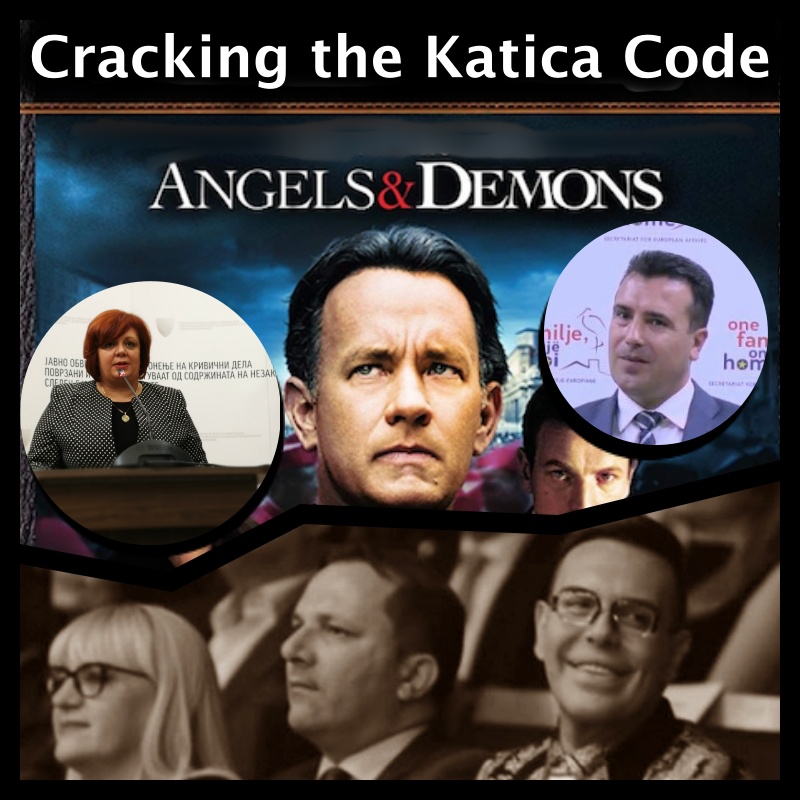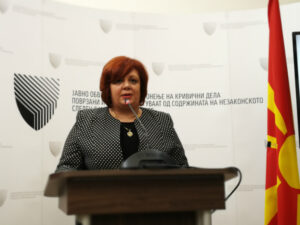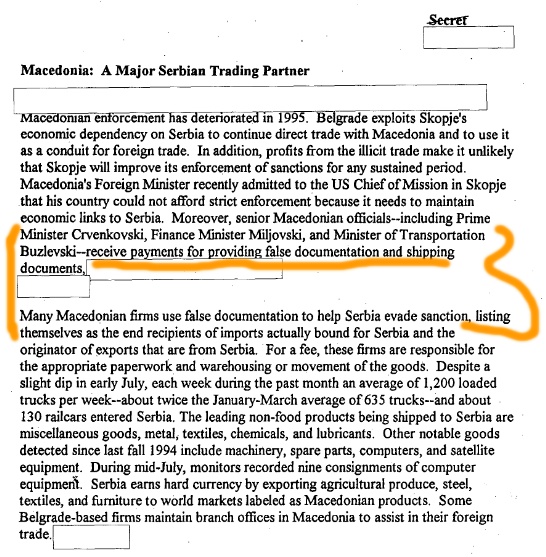
by Sasha Uzunov
Anyone facing criminal charges or under arrest or being investigated has the right to a presumption of innocence. Katica Janeva, the head of Macedonia’s much-vaunted but controversial corruption-fighting unit, the Special Prosecutor’s Office (SJO) has been taken into custody by the authorities in relation to an extortion racket involving a crossdresser Bojan Jovanovski aka Boki 13 and a prominent businessman Orce Kamcev, facing criminal charges in another matter.
Boki 13 and another man are also in custody. As yet no one has been found guilty; no criminal trial has even begun.
THE BARE BONES OF THE CASE ARE:
The bare bones of the case are Boki 13, who also ran a shortlived but well-financed pro-Zaev government television station, is alleged to have extorted money from wealthy people, namely Orce Kamcev and in return for payment, Boki 13 would have Katica Janeva either drop any criminal charges or give a softer sentence.
One of the first Macedonian journalist to break the story was Branko Geroski, ironically an ideological fellow traveller of PM Zaev. Another Macedonian journalist Goran Momirovski, a highly respected reporter, broke another corruption story which revealed the Secretary General of SDSM, Zaev’s party, Dragi Rashkovski, caught on audio asking for a kickback in a government tender and using racist insults against Italians and Roma (Gypsies).
Laris Gaiser, a Slovene Italian reporter, then began publishing stories and audio and video of Boki 13 allegedly involved in the shakedown of Kamcev. The scandal has picked up momentum despite the deliberate attempts of Zaev’s backers, the EU, in particular, to ignore it or play it down.
PM Zaev then in extraordinary outburt and came out with a thinly veiled attack against Geroski and also used a homophobic insult, peder (faggot) to refer to Boki 13. The Zaev media spinners went in damage control in trying to explain that it wasnt meant in a homophobic manner !

The Special Prosecutor’s Office (SJO in Macedonian) was set up in 2015 because of European Union pressure over a “crisis” – largely created by the EU and the US in the first place – to investigate wiretaps made by then Gruevski VMRO-DPMNE coalition government, in which corruption was revealed to have taken place.
An obscure provincial lawyer Katica Janeva (pictured right), who some believed from the beginning was out of her depth, was appointed as the head of SJO. She and her two other female colleagues running SJO were dubbed Charlie’s Angels and much publicity and fanfare generated by the Western media, including a documentary film.
Zaev got a hold of these wiretaps, called bombs, and began broadcasting them. As the leader of the main Opposition party, SDSM or the Social Democrats Zaev and his MPs had boycotted the Macedonian parliament for over a year in the lead up to 2015. ln 2016 the “Colour Revolution” sprang up – another EU and US-orchestrated movement – to ostensibly protest against the decade long corruption of Prime Minister Nikola Gruevski (2006-2016) but instead led to “regime change” and masking the real motive – changing Macedonia’s name and identity to lower enough Greek and Bulgarian opposition to get Macedonia into NATO.
The “racket” scandal has now reached a point where PM Zaev and his government are accused of being the alleged masterminds behind it all and have simply using Katica Janeva and Boki 13 as frontmen-women/front-women !
The Macedonian Parliament has voted to remove Katica Janeva from her position as Chief of SJO.
That’s it in a nutshell.
CORRUPTION IN MACEDONIA – a bigger racket than racket !
The interesting thing is corruption in Macedonia didnt start with the Gruevski government (2006-2016), contrary to the picture painted by Western pundits.
It existed pre 1991 when Macedonia was part of Federal Socialist Yugoslavia (SFRY) and intensified after independence when state-owned enterprises were “privatised” in a shady manner. From 1991 to 1998, SDSM under Prime Minister Branko Crvenovski undertook the selling off government-owned factories and companies.
When the wars in Yugoslavia erupted in 1991 and consequent UN sanctions were imposed upon the Slobodan Milosevic regime in Serbia to stop its wars in Bosnia and Croatia, it the was Crvenkovski government in Macedonia which played an active role in UN sanctions busting and smuggling for Milosevic. In mitigation, Greece imposing an economic blockade of its own upon Macedonia in opposition to its existence and using the name Macedonia.
Serbia being locked in as Macedonia’s traditional trading partner made sanctions-busting a battle for economic survival for Macedonia. But that isn’t assuaged when the likes of Crvenkovski was taking bribes for signing false transportation documents to allow Serbian imports and exports to pass through Macedonia. It’s one thing having to engage in sanctions-busting and smuggling to keep the country alive – Macedonia – and another when politicians enrich themselves out of other people’s predicament – in this case the Macedonian people and- and other people’s misery in war- the various ethnic groups of Bosnia: Muslim Bosniaks, Serbs and Croats.
Crvenkovski ranks as the one most morally corrupt politicians in post-1991 Macedonia. That he has benefitted from other people’s misfortune is shameful. That he has never been brought to account shows a number of things – corruption in Macedonia is deep and entrenched and the West despite imposing these sanctions against Serbia in the 1990s has been more than happy – and cynical – in using this compromised past of Macedonian politicians involved in UN sanctions-busting as blackmail – an extortion racket bigger than the Boki 13 racket and corruption on industrial scale.

1995 declassified CIA report on UN sanctions busting for Serbia
From Rethinking Security Governance: The Problem of Unintended Consequences edited by Christopher Daase & Cornelius Friesendorf:
“But while sanctions busting helped Macedonia cope under precarious economic circumstances, this activity also had serious and long lasting criminalizing circumstances. Large scale smuggling became institutionalised as a mode of wealth accumulation and smugglers acquired much greater power in Macedonian society.
“As the Financial Times reported at the time, the main side effect:
“Embargoes has been the encouragement of widespread smuggling which has created mafia-style gangs throughout the region. A new brash and violent “business class” has emerged which poses a long term threat to the development of legitimate, tax-paying business in the Balkans as a whole. (Robinson, 1995)”
– 2001 WAR – ethnic Albanian uprising in Macedonia linked to drugs trade.
US media – NBC – 2004 report:
“Ali Ahmeti is the leader of the ethnic Albanian rebel movement in Macedonia.
“Ali Ahmeti, the leader of the Macedonian rebel group, conceded in an interview with MSNBC.com that some of the rebels’ funding might come from narcotics trafficking and a flourishing sex slave trade in the region.
“But Ahmeti, whom the Macedonian government has arrested on drug charges in the past, maintained that the volume of donations to the rebel movement made it impossible to check their source.
“We try to vet all the money,” Ahmeti said in an interview high in his mountain headquarters in Sipkovica in northwestern Macedonia.
“But even Ahmeti admitted he counts rich Balkans smugglers among his supporters. “We’re not so fanatic to say that such money could not reach us,” Ahmeti told MSNBC.com.”
The immoral part of this corruption is the part played by the United States and its allies in supporting Ahmeti, in fact installing him in Macedonia via a war in 2001. That Ahmeti and crew have not faced any war crimes trial, in fact given an “amnesty” by the Gruevski Macedonia government in order to win favour with the US, tells of the level of corruption and double standard at play. A Macedonian police reservist, Johan Tarucovski, an ethnic Macedonian being the only “cuplrit” in the war and convicted of “war crimes” whilst those who actually started the war, such as Ahmeti let off and groomed for bigger and better things by the West.
It’s no coincidence that he remains a useful politicial client who has played his part in keeping Macedonia destablised and weak for US strategic interests, which have included changing Macedonia’s name, erasing its identity and setting the country on the path of federalisation and eventually partition.